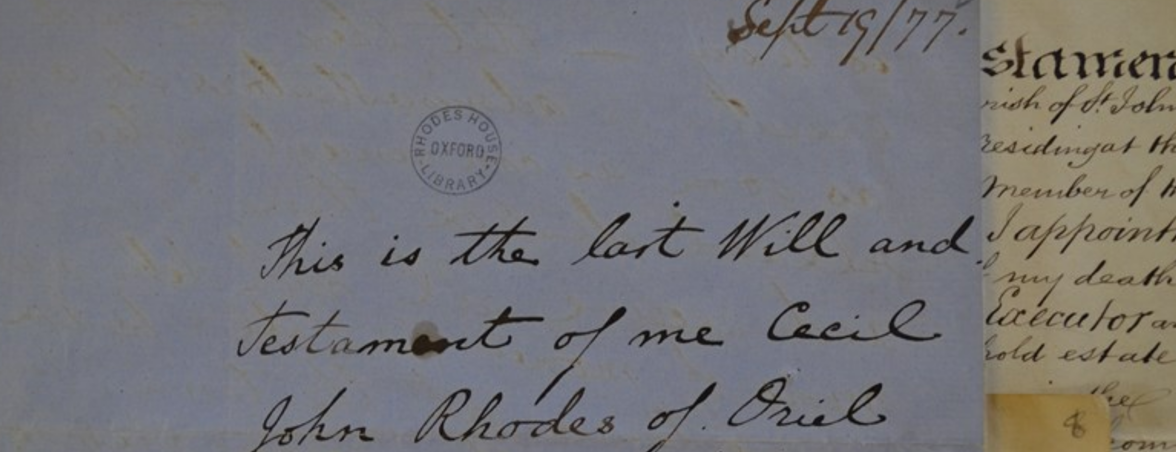The life and legacy of Cecil Rhodes has long been a subject of debate. The obituaries published after his death in 1902 set the terms of a discussion that has since continued and widened. The left-leaning Manchester Guardian (now The Guardian), for example, acknowledged Rhodes’s ‘extraordinary power of getting things done in the political world’ while also offering the view that he was ‘a dragon efficient in tooth and claw’. Summarising the obituary in the traditionally conservative English newspaper The Times, the New York Times recorded its verdict that Rhodes ‘had many faults; his character had serious limitations, but such as he was he spent himself absolutely in the service of his country’.
In March 2015, a new round of the debate ignited when a protest began at the University of Cape Town, leading to the removal of the statue of Cecil Rhodes there. The Rhodes Must Fall movement spread, including to Oxford, where the statue of Cecil Rhodes at Oriel College became what Oriel has termed ‘a focus for public debate on racism and the legacy of colonialism’. In 2017, one response to the protests was given by Oxford academic, Professor Nigel Biggar (at that time Regius Professor of Moral and Pastoral Theology) who published an article in The Times entitled ‘Don’t feel guilty about our colonial history’ [this article sits behind a paywall. Nigel Biggar’s views can also be read on the website for his ‘Ethics & Empire’ project]. In response, a group of Oxford academics wrote to express their ‘opposition to the public stance recently taken on these questions by Nigel Biggar’.
With the advent of the Black Lives Matter movement in 2020, protest and debates intensified. Dr Simukai Chigudu, Associate Professor of African Politics at the Oxford Department of International Development and Fellow of St Antony’s College, wrote in the Guardian in 2021 about ‘life in the shadow of Cecil Rhodes’. He also recorded a podcast about his article, reflecting on his experiences growing up in Zimbabwe before moving to the UK, where he became part of the movement whose ‘goal was to slay the racist ideologies that still held sway in various disciplines, to bring more Black people into academia at every level, and to end the glorification of the men who had dedicated their lives to advancing the colonial project’.
One of the colonial symbols in Oxford to which Simukai Chigudu referred is the image of the Zimbabwe bird that appears at Rhodes House. On the Zimbabwe bird and Rhodes’s actions in relation to the site of Great Zimbabwe you can read Professor Shadreck Chirikure, Edward Hall Professor of Archaeological Science at Oxford, on ‘Reclaiming Great Zimbabwe’s past to learn lessons for the future’. For more on Rhodes’s legacy in Zimbabwe (and the use of the image of the Zimbabwe bird within the architecture of Rhodes House), you can read an article by Uncomfortable Oxford.
In 2021, alongside an account of the College’s response to protests centred on the statue of Rhodes, Oriel published an analysis of Cecil Rhodes by Professor William Beinart (emeritus professor, St Antony’s College, Oxford) setting out evidence for what he termed ‘disturbing aspects of the past, in which Oriel and Oxford are entangled’, together with a response to Beinart’s piece by Nigel Biggar.
Debate about Rhodes and his legacy has long been engaged with by Rhodes Scholars. In his 1990 biography of Rhodes, Robert Rotberg (New Jersey & University 1957), wrote that ‘Rhodes’s disregard of… the human and political value of Africans foreshadowed, indeed prepared the path for the segregationist attitudes and legislation’ that would come under the later apartheid regime. In the wake of the Rhodes Must Fall debates, Naseemah Mohamed (Zimbabwe & St Edmund Hall 2013) offered the view that ‘we should know and not forget where the money that now funds the Rhodes scholarship came from, and the heavy price of human lives at which this prestige was bought’.
In 2024, Robert Calderisi (Québec & St Peter’s 1968) took part in the Trust’s Scholars' Library series, talking about his experience as a Rhodes Scholar and about his new book, Cecil Rhodes and Other Statues: Dealing Plainly with the Past. He explained that his study of Rhodes arose from that fact that he felt ‘One shouldn’t be happy with received opinions on anything’.
In what we know will be an ongoing debate, we offer in conclusion here the view of Edwin Cameron (South Africa-at-Large & Keble 1976). Speaking to new Rhodes Scholars in South Africa in 2020, he said, ‘The past is there not as history, but as present. It challenges our present complicity in injustice – by reminding us of what others, but also we, are capable.’

